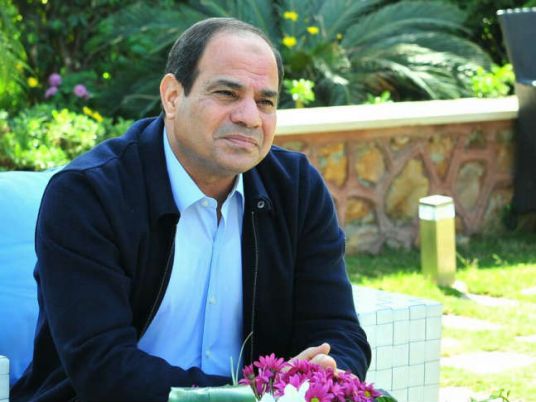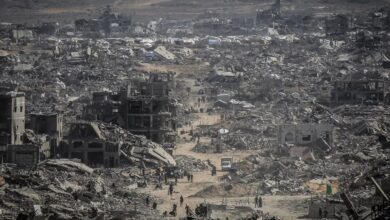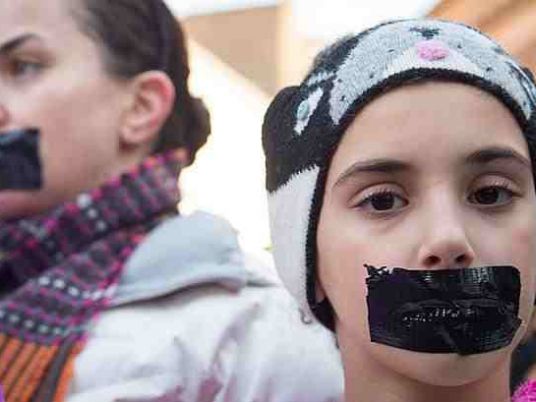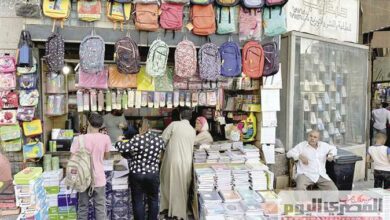
Abdel Fattah al-Sisi was sworn in as the sixth president of Egypt on June 8, 2014 — two years ago this week. As Sisi hits the half-way point in his first term, supporters and critics are debating his performance in office, measuring his various achievements — and failures — against the range of promises he made early on.
Sisi announced his candidacy for the presidential elections in March 2014, spending two months on the campaign trail before being elected in late May. For much of this time, however, he was roundly criticized for not revealing a detailed political or economic platform, relying instead on his credentials as a military man capable of restoring security to the nation.
For some, this reluctance to discuss policy was evidence that Sisi wished to avoid tricky questions, while others said that he had no platform in the first place — aside from asserting the control of the security state.
When the former general finally revealed the key points of his program, he emphasized large-scale infrastructure and industrial developments that would facilitate economic growth. He highlighted measures to boost the tourism industry, a cornerstone of the Egyptian economy.
He also promised an overhaul of the health system, and proposed numerous improvements of a social and political nature. He said he would maintain good relations with the Gulf and the West, and secure much-needed sources of funding.
Sisi's supporters say that there have been many successes in the past two years. They counsel patience, suggesting that many pledges that are not yet fulfilled will eventually come to fruition.
They say the president has been hampered by an insurgency in Sinai, but has managed to contain it, even putting the terrorists on the back foot. They also point to several apparent economic successes, such as the Suez Canal Area Development Project and the reclamation of desert land that has produced new harvests this year.
According to Sisi's detractors, however, few of his many pledges have come to fruition. In some cases, they argue, the projects did not have the desired effect and were abandoned. In other cases, they remain incomplete or have not even begun.
After two years in office, they say, there should be more evidence of success — rather than a litany of failures.
Below are some of the key areas in which they say Sisi has failed to fulfil promises.
Boosting tourism
In May 2014, Sisi promised to establish 26 new urban and touristic developments, along with eight new airports. A key aim was to boost the numbers of foreign tourists, thereby increasing tourist revenue and foreign currency — both essential for economic success.
However, the planned new developments are still far from complete. One example is the 17,000-acre Galala City project, on the western shore of the Gulf of Suez. The project is intended to include a university, a hospital, residential areas and a touristic development. But when Sisi visited the site in January, little progress had been made.
While Sisi has been careful not to make too many predictions about the future growth of the tourism industry, he did identify it as a key plank of is economic policy of boosting growth. However, in the first quarter of 2016, foreign tourist numbers were 40 percent lower than in the same period last year.
Defenders of the president will point out that progress in the tourism sector has been hampered by various unexpected events largely beyond the president's control. In combination, they have damaged the image of Egypt as a tourism destination and kept tourism officials locked in fire-fighting mode.
The first, in September 2015, was the accidental killing of several Mexican tourists by security forces hunting for Islamist insurgents in the Western Desert. This was followed in October 2015 by the downing of a Russian airliner over Sharm el-Sheikh, with the loss of 224 people on board. Then in January this year, Italian student Giulio Regeni was abducted, tortured and murdered in Cairo.
Further blows were dealt by the hijacking of an EgyptAir plane from Alexandria to Cyprus in March, and the disappearance of an EgyptAir plane over the Mediterranean Sea in May, with the loss of 66 lives.
After the incident, Tourism Minister Yehia Rashed said Egypt would need to work 10 times harder now to revive the tourism industry.
Controlling inflation
Sisi has promised several times to tackle soaring prices of consumer goods. During an interview before taking office, he suggested introducing parallel mechanisms to provide basic commodities in order to keep prices stable.
Among the key methods attempted so far is the deployment of refrigerator trucks to public squares, selling subsidized rice, meat and poultry products. The armed forces have been applying similar methods, but so far with limited success.
According to World Bank statistics, consumer price inflation rose from 10.1 percent in 2014 to 10.4 percent in 2015. This week, the government statistics agency CAPMAS said that urban consumer price inflation had jumped to 12.3 percent. While CAPMAS said the rush on food for Ramadan was partly to blame for the jump, the overall trend is upward.
Boosting industry
Sisi promised to establish 22 new industrial developments to boost the metallurgical industry. The so-called "industrial cities" were planned for Behaira, Qena and Minya governorates, along with Aswan, Luxor and North Sinai.
The aim of the project was to shift away from exporting raw materials to processing raw materials before export, thereby adding value and increasing revenue, with the metallurgical sector a key priority.
The president also promised to restart those factories that had halted production in recent years, asserting the control of the state in an effort to revive Egyptian industry. The program included the option of renationalizing various plants that had been privatized and later failed.
As with so much else, critics say progress has been slow, although the recent creation of the Public Business Sector Ministry seems to be a step in the right direction, so far as supporting state-owned industry is concerned.
And, while the government points to a range of new industrial plants linked to the Suez Canal Area Development Project — some of which involve Russian and Chinese funds — detractors say the projects are still little more than plans and building sites, with no industrial output worth measuring.
Comprehensive health care system
The president promised to create a comprehensive public health care system that would provide affordable health care for all citizens. However, so far, the bill for the creation of this system has not yet been presented to parliament for discussion.
Egypt's current public health care system has been widely criticized for the poor quality of service provision. In many cases, basic materials such as bandages must be provided by the patients themselves, since hospitals do not provide them.
Meanwhile, those with enough money to spare turn to Egypt's growing private health care system. Indeed, many of the government’s critics say there is a deliberate policy of favouring private health care at the expense of public provision, a view shared by many members of the Doctors Syndicate who been outspoken in demanding reforms that favor the poor.
Redrawing the governorates
During his presidential campaign, Sisi promised to devise a plan to modify the administrative borders of the governorates. The proposed division would give each governorate access to areas of desert or coastline suitable for development. In this way, they could either reclaim desert land for agricultural purposes or build touristic projects along the coast.
The proposed redrawing of boundaries would increase the number of governorates to 33.
However, so far, this project has not come to fruition. A presidential committee was instructed to work on the plan, and a report was issued. However, the president has yet to issue a final decision on when and how to proceed.
Releasing detainees
On several occasions since being elected, the president has promised to release detainees held on charges pertaining to freedom of speech and thought, including breaches of the protest law.
In September, true to his word, he pardoned 100 people who had been detained for taking part in illegal protests, and also set free two Al-Jazeera journalists accused of espionage.
However, the president’s detractors say that while he periodically releases detainees, his government has overseen an ongoing program of repression, including widespread arrests of activists and journalists. They say that thousands are still behind bars for the role in protests since January 2011.
Rather than loosening the state's grip on public expressions of dissent, they claim, Sisi has tightened control, instigating a "crackdown" on critics. For example, on April 25 this year, police arrested dozens who protested against the president’s decision to transfer two Red Sea islands to Saudi control.
Sisi promised to release those detained in connection with the protests, and so far 33 have been set free by court order.
Media freedom
The president promised during his campaign to put forward bills ensuring freedom of speech and the media. Progress on this issue has been slow so far, and critics say that progress on legislation is outweighed by judicial efforts to stifle dissenting voices.
The government has approved Unified Media and Press Law, but as yet it has not been put into effect, leaving journalists and media professionals uncertain of the future.
Moreover, several prominent journalists have been prosecuted or detained for remarks critical of the government or public officials. In one recent, high-profile case, Journalist Syndicate Chairman Yehia Qalash and board members Khaled al-Balshy and Gamal Abdel Rahim were charged with publishing false news and giving shelter to journalists wanted on an arrest warrant.
Critics of Sisi maintain that publishing or broadcasting material directly critical of the government is still fraught with danger.




